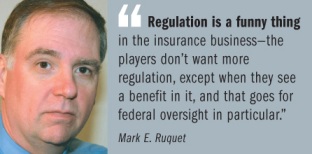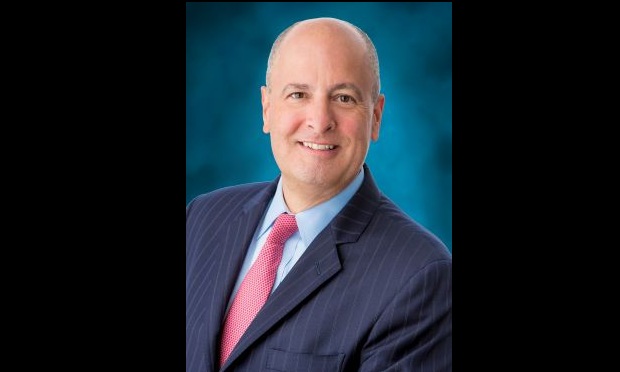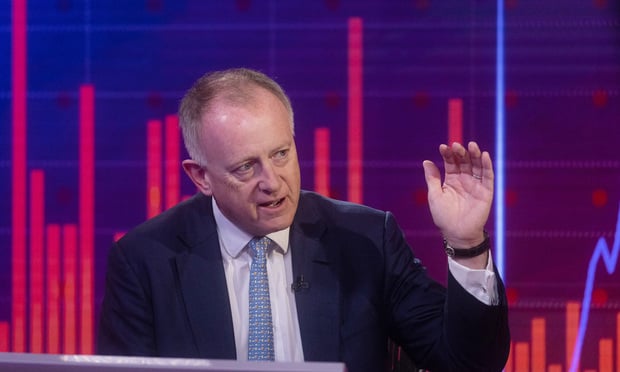Try to imagine this dream sequence–sort of a remake of “The Treasure of Sierra Madre.” A grim lawman walks in on a group of insurers and demands to see their books. The meanest-looking one in the gang glances up from his spreadsheets and eyes the interloper suspiciously.
“Who do you think you are?” he demands, with a bit of venom in his voice.
The lawman sternly, but politely replies that he is the federal “Too-Big-To-Fail” regulatory marshal.
 The unimpressed executive looks the marshal up and down, and with the same dismissive sneer says: “Regulator? We don't need no stinkin' federal regulator!” A fight breaks out as attorneys and lobbyists jump from the shadows, with subpoenas flying in a blizzard of commotion.
The unimpressed executive looks the marshal up and down, and with the same dismissive sneer says: “Regulator? We don't need no stinkin' federal regulator!” A fight breaks out as attorneys and lobbyists jump from the shadows, with subpoenas flying in a blizzard of commotion.
That is the nightmare many insurance executives have had over the years, particularly with new federal insurance rules being suggested following the near-collapse of our economy in late 2008.
Yet regulation is a funny thing in the insurance business–the players don't want more regulation, except when they see a benefit in it, and that goes for federal oversight in particular.
Take the latest developments in financial services regulatory reform. To the relief of many insurance players, it seems likely that final legislation being crafted will not assess insurers for broader financial system risks.
You don't have to look too far back to understand why insurers were originally targeted (with American International Group being Exhibit A). However, insurers argued furiously for an exemption, noting their participation in state guaranty funds, and the fact that insurance had nothing to do with the financial woes facing the economy.
But that doesn't mean there isn't a role for Uncle Sam in regulating insurance, particularly when it comes to establishing uniformity. Many believe there should be a national insurance office of some kind, for example, to help negotiate global trade agreements involving the business.
In addition, there's the patchwork system of surplus lines, where Washington could play a constructive role in establishing uniformity. During the recent meeting of the Risk and Insurance Management Society in Boston, Brian Duperreault, president and chief executive officer of Marsh & McLennan Companies, noted that MMC–among many other insurance players–backs federal surplus lines regulatory reform that would significantly reduce the expense of collecting taxes on such transactions.
“We collect $60 million in surplus lines tax and spend $20 million” to pay the states, Mr. Duperreault said, adding, “It is a very inefficient way to do it.”
However, he added that while he was once a proponent of an optional federal charter, he changed his mind because he believes that instead of promoting efficiency it would do just the opposite. “Instead of having 50 regulators, you will have 51,” he remarked, worrying that the change would only produce more paper work.
He credited the current state system with doing an outstanding job of protecting carrier solvency, but on the issue of efficiency, said it leaves much to be desired.
At the same RIMS session, Brian Glaser, CEO of MMC's Marsh insurance brokerage unit, called the current system of having to get 50 individual licenses to conduct U.S. insurance business “nonsensical.”
“It is easier to do business in the European Union than it is in the United States,” he noted.
In yet another regulatory conundrum, the greatest piece of theater at this year's RIMS annual conference was the debate over contingent commissions.
The first salvo was fired by Willis Group Holding's Chair and CEO Joe Plumeri, with a high-profile press conference at his exhibit booth to herald the launch of a website (www.clientsbeforecontingents.com). The goal, he and other Willis executives said, is to educate risk managers about the dangers of contingents and why they present a conflict of interest for brokers.
Willis says it is not accepting contingents on its brokerage business, and is phasing them out of its operation entirely, while calling on others–especially Aon, Arthur J. Gallagher and Marsh–to swear them off as well. Meanwhile, he called on buyers to go with brokers that have already done so.
The other big brokers did not roll over and play dead on this issue, with their own chief executives rising to the occasion to address the dilemma in separate forums.
Mr. Glaser of Marsh went so far as to call the entire dust-up a “red herring,” charging that it's misleading to categorize any broker that accepts contingents as doing less than what's best for clients. He argued for disclosure as a solution, noting that even standard commissions can be manipulated to create conflicts.
Looking back, I give Mr. Plumeri credit for voicing concerns about contingents even before New York's former attorney general, Eliot Spitzer, entered the picture and exposed bid-rigging and contingent abuse.
We need to remember, however, that it was not a perception of a conflict of interest that got certain brokers and insurers in hot water. It was clear evidence of fraud on the part of a few that caused the ruckus.
Steering contracts to certain carriers in return for very lucrative contingents and having other carriers file false bids to help cover-up the action is what produced the legal wrangling with attorneys general.
As a few of the industry's leaders said during the RIMS conference, the question is not about contingents per se–it is about behavior. A bad actor can undermine the integrity of any business with a client. Regulation is part of the equation to prevent abuse or outright criminal behavior, but risk managers need to be vigilant as well.
This is a tricky issue because while RIMS has come out against contingents, there never has been a groundswell of support for a ban from commercial insurance buyers.
While the bigger brokers were prohibited from taking such fees for a time, for most producers and their clients it's been business as usual, creating an unlevel playing field.
When the big brokers were deemed repentant, permission was granted so everyone could feed equally from the same trough–albeit with full disclosure under rules being put in place by New York State.
How this all plays out in the market remains to be seen. Marsh, which lost about $1 billion in income by giving up contingents, will now only accept them on their emerging independent agency business.
RIMS continues to speak out, but ultimately it will be up to the market to decide what's appropriate, which is why Willis launched its website and renewed its campaign to highlight its position on the evils of contingents.
Whether contingents stay or go, one would imagine that the industry could agree that a comprehensive disclosure regulation would be the least brokers could decide on to maintain a standard of ethics. However, when it comes to the glacier pace of insurance reform on a national scale, Mr. Glaser summed it up best when he said, “Inertia is a powerful, powerful thing. It is hard to get momentum [to change things].”
Ultimately, in the integrity dance between risk manager and broker, regulation will not make a broker honest. It comes down to a simple question: Who can you trust?
Mark E. Ruquet is an Associate Editor covering the producer beat. He may be reached at [email protected].
Want to continue reading?
Become a Free PropertyCasualty360 Digital Reader
Your access to unlimited PropertyCasualty360 content isn’t changing.
Once you are an ALM digital member, you’ll receive:
- Breaking insurance news and analysis, on-site and via our newsletters and custom alerts
- Weekly Insurance Speak podcast featuring exclusive interviews with industry leaders
- Educational webcasts, white papers, and ebooks from industry thought leaders
- Critical converage of the employee benefits and financial advisory markets on our other ALM sites, BenefitsPRO and ThinkAdvisor
Already have an account? Sign In Now
© 2025 ALM Global, LLC, All Rights Reserved. Request academic re-use from www.copyright.com. All other uses, submit a request to [email protected]. For more information visit Asset & Logo Licensing.








